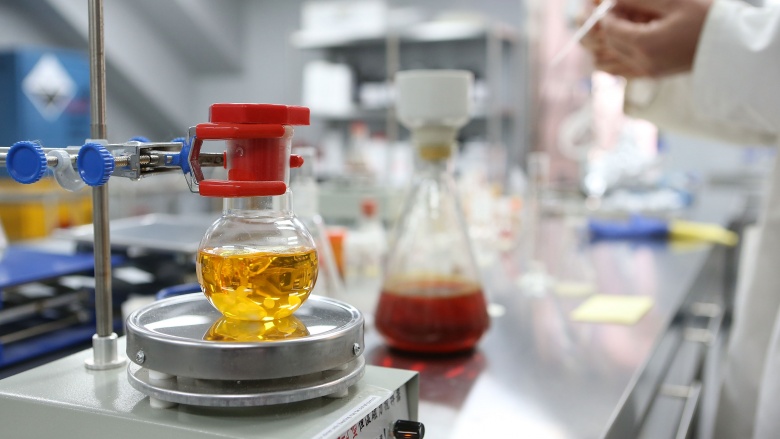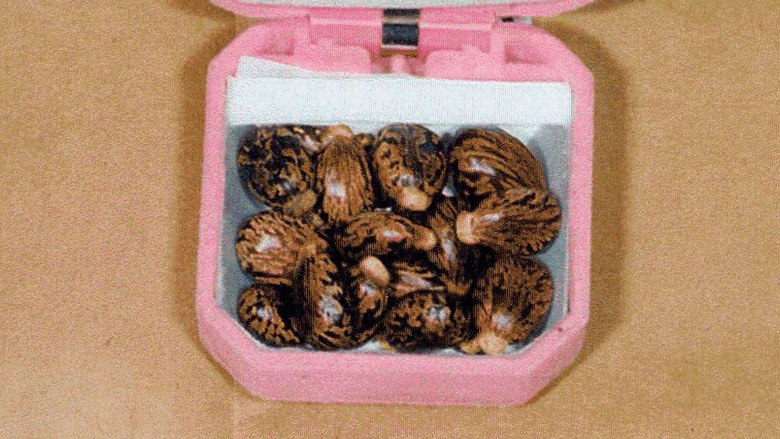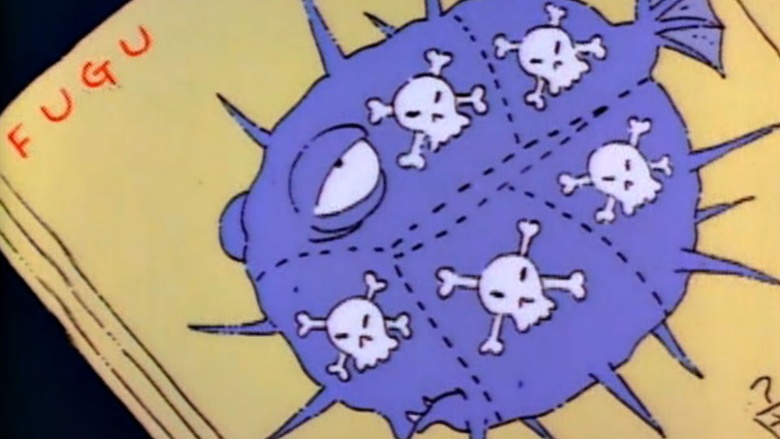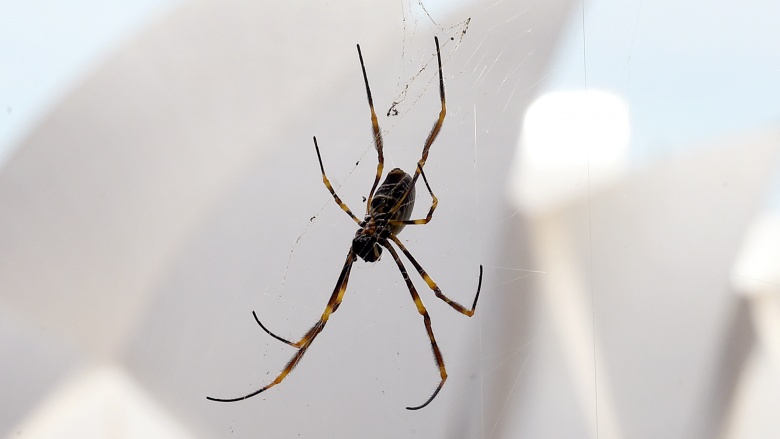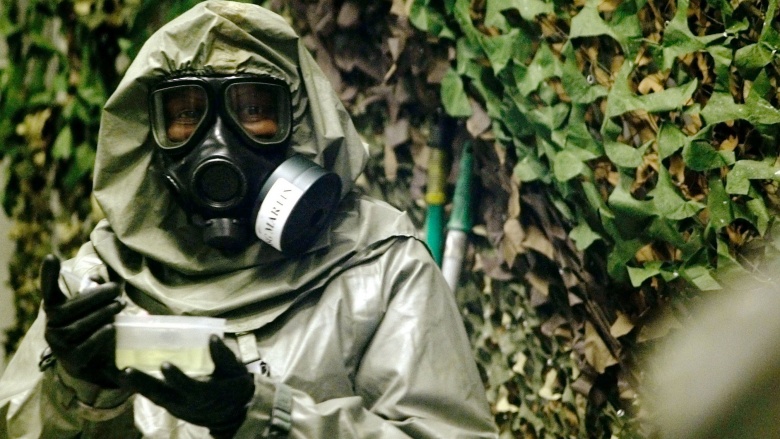Terrifying Poisons And How They'll Kill You Horribly
Sorry, Charlie, but this blue-green ball that we call home is full of stuff that's trying to kill you. Around every corner are microscopic amounts of poisons that can kill you in a thousand cruel and painful ways. Whether these toxins live in the glands of animals, seep up naturally through the Earth, or escape from labs, exposure to many of them is nearly guaranteed death. Here are but a few to watch out for, and what they'll do to your puny, delicate body.
Dimethylmercury
There was a time when dimethylmercury was needed to explore specific scientific applications within the confines of a lab, but science has since created safer compounds to use, which is good news. Because dimethylmercury is the most deadly neurotoxin on Earth. Now, the only thing it can really do is kill scientists; it passes through standard lab gloves without hesitation, and if you can smell it, you're already dead. One tenth of a milliliter sends you down the long, painful road of acute mercury poisoning, which includes stomach pain, slurred speech, and eventually, becoming trapped in your own body before you die.
Russel's Viper Venom
Watch your step if you're vacationing in India, because the Daboia snake will cause the blood in your body to congeal into Jello, which is obviously not a good thing. The snake's genus refers to the Hindi word for lurking and hiding, so it's not an exaggeration to suggest watching your footfalls. While many hemotoxins thin your blood into a watery, useless mess, Russel's viper coagulates things beyond control, making you pee blood, throw up, and possibly suffer complete kidney failure. If you survive, you're in for weeks of intense pain and blisters, and a lifetime of reduced organ function.
Ricin
Fans of Breaking Bad already know the deadly effects of ricin, which is purified from castor beans, but allow us to recount the terrible effects anyhow. If you happen to ingest ricin like poor Lydia, good news; your stomach might get crampy, but your digestive acids are okay at handling the worst of it... unless you unknowingly consume a relatively large quantity, like a stevia packet full. Unfortunately, if ricin gets into your body by other means, such as through an open wound, your chances are far worse, because that stuff has a direct path into your bloodstream, where it immediately begins to interrupt your normal cell processes, which you kinda need. Your organs bleed out and you die.
Carbon Monoxide
Carbon monoxide might not be the most painful or deadly poison out there, but it's definitely the sneakiest. It can creep into your home through a malfunctioning appliance, incapacitate you with dizziness, confusion, and headaches, and kill you before you wake up from your nap. Because it can't be sensed by the human body, most homes have a detector to alert families to problems, but those batteries are hard to change. Reports say that up to 500 people die of carbon monoxide poisoning every year when their blood doesn't get enough oxygen, and though most survivors recover completely, partial brain necrosis is not out of the question.
Tetrodotoxin
Alternately known as "that stuff that almost killed Homer when he ate fugu," tetrodotoxin, or TTX, is found in a variety of species of marine life, and even a species of newt. Science is divided on whether or not all of these animals actually produce the poison, or if it's just a product of the helpful bacteria that they harbor. But either way, there's a reason that it's illegal to keep a blue-ringed octopus as a pet. TTX is far more toxic than cyanide by a degree of magnitudes, there's no antidote, and it'll kill you by interrupting signals between your brain and your body, which means you can't use your muscles, effectively suffocating you inside of your own body.
Polonium-210
Number 84 on the periodic table, Polonium is the Ted Nugent of the elements: potentially dangerous and mostly useless. Polonium-210 has absolutely no function in life on Earth, and handling it is insanely dangerous because of how radioactive it is. The isotope's radiation cannot pass through your skin, but it will seek out any available opening you have to infiltrate and kill you, usually by organizing a prolonged battle with terrible cancer. While there are many isotopes of Polonium, a single gram of Po-210 could potentially kill 10 million people, and injure another 10 million, without blinking an eye. Why do these things even exist?
Brown Recluse Venom
The brown recluse spider is native to your shoes and under your pillow, as well as most of the North American south, and is known to be an active midnight hunter, so sweet dreams, sucker. The while spider won't actively seek out human prey, it will bite if it's accidentally threatened, and though the bite cannot always be felt, the hemotoxin delivered can cause large patches of flesh and skin to die, sometimes necessitating surgical removal. Most healthy adults can deal with the effects, but if you're very young or enfeebled, the poison can cause ruptured blood cells, blood thinning, organ failure, and possibly death.
VX
VX, otherwise known as "Ethyl ({2-[bis(propan-2-yl)amino]ethyl}sulfanyl)(methyl)phosphinate," has the coolest and most useful nickname in all of science, because no one is saying that full thing. It was originally intended to be used as an insecticide, but was deemed too harmful for casual use and was repurposed by the British Armed Forces as a potential weapon. A substance like car oil, VX will cause intense muscular contractions, shortness of breath, loss of bowel control, eye blisters, and eventually, suffocation from loss of muscle control. In the event you survive, VX is known to cause serious mental disorders, so there are no happy endings here.

